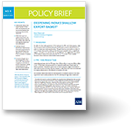
RCI-POD
WEBINAR 3
10:00–11:30am
Manila Platform: Microsoft Teams Meeting
Immediate and Long-Term Impact of COVID-19 on Trade Landscape
COVID-19 has impacted both demand and supply side of economy. Shrinking demand and value chain disruption can cause double whammy to the international trade landscape. This webinar discussed how much immediate impact of COVID-19 on trade will be and how the pandemic will affect the longer-term trade landscape, including on trade in services, and global value chain structures, along with appropriate policy responses at regional and global levels.
Video Link:
-
Link to YouTube
Downloads:
-
Brochure (PDF)
Previous Episode:
-
Risks of Financial Contagion Through the Global Banking Networks
16 Jun 2020 10:00–11:30am
Manila Next Episode:
-
Food Security in Asia and the Pacific Amid the COVID-19 Pandemic
7 Jul 2020 11:00–12:30pm
Manila Featured publication:
-

- Presentations:GTAP-Based COVID-19 Impact on Trade
 James Villafuerte Senior Economist, ADBBio Presentation
James Villafuerte Senior Economist, ADBBio PresentationJames Villafuerte is a Senior Economist at the Regional Cooperation and Integration Division in the Economics Research and Regional Cooperation Department of the Asian Development Bank. Prior to joining the ADB, he worked as: a Team Leader of the Asia Regional Integration Center at the ADB; a Senior Economist at the Department of Treasury in Finance in Melbourne Australia; and an Economist at the Poverty Reduction and Economic Management team at the World Bank Office in Manila (2002-2004).
His areas of expertise include macroeconomic forecasting, fiscal strategy, economic surveillance, early warning system, and tracking the progress of Economic Integration in Asia. He contributes regularly to the ADB’s flagship publication—the Asian Economic Integration Report—where he is now leading the preparation of the 2020/21 theme chapter on Digital Platforms: Implications for Developing Asia.
Mr. Villafuerte obtained his Master’s and Bachelor’s degrees in Economics from the University of the Philippines. He has also completed training: a) on General Equilibrium Analysis at the Center of Policy Studies, Monash University; and b) on Global Trade Analysis in Purdue University in Indiana.
The Impact of COVID-19 on Trade and Trade Policy Matthias Helble Economist, ERCI, ADBBio Presentation
Matthias Helble Economist, ERCI, ADBBio PresentationMatthias Helble is an economist in the Economic Research and Regional Cooperation Department of the ADB in Manila. Previously, he was a Senior Research Fellow and Co-Chair of the Research Department of ADBI in Tokyo. His research interests include international trade and development. His research has been published in numerous scientific journals as well as in flagship reports of international organizations. His publication record also includes nine books, including with Oxford University Press. His columns and policy work have been published and cited by prominent international media. Matthias began his professional career at the World Bank in Washington, DC, before joining the World Health Organization in Geneva, Switzerland. He then worked as an economist for the World Trade Organization as well as the United Nations. He holds graduate degrees in economics from the University of Tübingen, the University of Wisconsin-Madison, and the Graduate Institute of International and Development Studies (PhD) in Geneva. During his doctoral studies he was a research fellow at Yale University.
Moderator: Matthias Helble Economist, ERCI, ADBBio
Matthias Helble Economist, ERCI, ADBBioMatthias Helble is an economist in the Economic Research and Regional Cooperation Department of the ADB in Manila. Previously, he was a Senior Research Fellow and Co-Chair of the Research Department of ADBI in Tokyo. His research interests include international trade and development. His research has been published in numerous scientific journals as well as in flagship reports of international organizations. His publication record also includes nine books, including with Oxford University Press. His columns and policy work have been published and cited by prominent international media. Matthias began his professional career at the World Bank in Washington, DC, before joining the World Health Organization in Geneva, Switzerland. He then worked as an economist for the World Trade Organization as well as the United Nations. He holds graduate degrees in economics from the University of Tübingen, the University of Wisconsin-Madison, and the Graduate Institute of International and Development Studies (PhD) in Geneva. During his doctoral studies he was a research fellow at Yale University.
Panelists: Sherry Stephenson Member, Services Network, PECCBio
Sherry Stephenson Member, Services Network, PECCBioSherry Stephenson was a Senior Fellow with the International Centre for Trade and Sustainable Development (ICTSD) in Geneva from 2013 to 2018, where she developed and executed a work program on services, covering multilateral, plurilateral and regional services issues. Prior to the ICTSD, she worked with the Organization of American States (OAS) in Washington DC, where she guided the organization during the Free Trade Area of the Americas (FTAA) negotiations (1995–2004). Before the OAS, Dr. Stephenson was an Advisor to the Ministry of Trade in Indonesia where she assisted the Government in developing its final offer for the Uruguay Round. Previously, she has worked with the OECD, GATT and UNCTAD Secretariats. Dr. Stephenson has published three books and numerous articles. She was a member of the World Economic Forum’s Global Trade Agenda Council and contributed to its annual reports of 2011, 2012, 2013, and 2014. She is currently a member of the PECC Services Task Force as well as the T20 Trade Investment and Globalization Task Force, and has contributed to its Policy Briefs on Services.
 Jong Woo Kang Principal Economist, ERCD, ADBBio Presentation
Jong Woo Kang Principal Economist, ERCD, ADBBio PresentationJong Woo Kang is principal economist at the Economic Research and Cooperation Department of the Asian Development Bank (ADB). He is a seasoned economist with extensive knowledge and experiences on policy and strategic issues. He was Senior Advisor to the Managing Director General of ADB and Senior Economist at Strategy and Policy Department at ADB. He leads the annual publication of Asian Economic Integration Report. Areas of his research interest include regional integration, inclusive growth, macroeconomic and international trade policies and aid effectiveness. He has published research articles in academic journals, including Journal of Development Economics and Journal of Applied Economics, and wrote numerous blogs and opinion articles on global macroeconomy and international trade and finance. Before joining ADB, he was director at Ministry of Finance and Economy of Korea. He had got his BA in economics and MA in public administration from Seoul National University, and PhD in Economics from University of Washington.
 Rey Untal President and CEO, IT and Business Process Association PhilippinesBio
Rey Untal President and CEO, IT and Business Process Association PhilippinesBioRey Untal, as IBPAP’s President & CEO, plays the crucial role of being the voice of the Philippine IT-BPM industry. One of his key roles is to advocate for the Philippines’ unique value proposition in order to attract investors and locators to the country. He also works passionately with key stakeholders in the academe and the government to help sustain the growth of the sector globally and domestically.
He spent 19 years working at Accenture where he started off as an Experienced Manager providing consultancy services to a number of international and local clients, which led to a three-year expatriate assignment in Australia and Singapore. He was then promoted to Managing Director in 2006 and from there assumed a broader set of project management responsibilities. Until his retirement in August of 2016, he served as the Industry Group Lead for the Communications, Media & Entertainment, and High-Tech Portfolio in Accenture’s Philippine Delivery Center. Mr. Untal also worked at Nestle, Cargill, and ICTSI earlier in his career.
Mr. Untal graduated from Ateneo de Manila University with a double degree in Physics & Computer Engineering. He resides in Metro Manila with his wife and 2 children.
 Mia Mikic Director, UNESCAPBio
Mia Mikic Director, UNESCAPBioMia Mikic is Director, Trade, Investment and innovation Division in United Nations ESCAP. She also coordinates the Asia-Pacific Research and Training Network on Trade (ARTNeT), an open network of research and academic institutions and think-tanks in the Asia-Pacific region and covering all key means of implementation of the Sustainable Development Goals. Previously, she was Professor of International Economics at the University of Zagreb, and Senior Lecturer at the University of Auckland. She is the author of a number of reports, papers and has edited or co-edited several volumes, including on regional integration with Bruno Jetin, ASEAN Economic Community- A model for Asia-wide regional integration?,2016. She oversees preparation of Asia-Pacific Trade and Investment Report, a flagship publication in area of trade and investment. Her current work focuses on the trade policies and GVCs, services trade, non-tariff protection, frontier technologies use for inclusive future of work, and evidence-based policymaking in trade, investment and innovation. She has a Doctorate in Economics from the University of Zagreb.